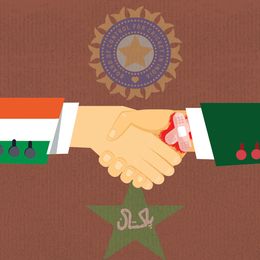India’s victory in the ICC Champions Trophy in Dubai this month was reason enough for massive celebrations. That is but natural in our cricket crazy nation. But this particular success is being seen by many as something far beyond a sporting triumph.
For more than a decade, India has refused to have bilateral sporting ties with Pakistan, only agreeing to play them in multilateral tournaments at neutral venues. But this time Pakistan was the sole host of the championship. Nonetheless, India stuck to its stand and got its way. Playing and winning all its matches in Dubai, including against Pakistan, India caused the final itself to be held outside the host country. Social media is awash with memes projecting this as also a diplomatic coup, one that showcases a resurgent Bharat’s growing soft power and clout. There is much to unpack from this inference, which is accurate but simplifies a complex back story.
First, there is the big question of whether two nations embroiled in a cold war, which regularly boils over into terrorist attacks and border skirmishes, can or should maintain sporting ties. The Pakistani establishment—long complicit in funding, training, and using Islamist proxies for cross-border terrorism against India—has been staunchly in favour of resuming bilateral cricket.
That is consistent with Pakistan’s advocacy for uninterrupted bilateral talks, too, even in the midst of continual terror attacks by its proxies. It ties neatly into their infamous strategy of “bleeding India with a thousand cuts”, since outright wars had failed, and, in fact, had led to the vivisection of Pakistan.
But this strategy requires the illusion of normalcy, of business as usual, with India acquiescing to cricket and dialogue in place of extracting a cost for Pakistan’s perfidies. India has stopped acquiescing for the past decade, after a couple of final attempts at rapprochement by Prime Minister Narendra Modi back in 2014.
Some in India had naively supported uninterrupted sporting ties and dialogue as a path to peace. Their good intentions notwithstanding, they failed to see the bitter truth of how that path was being used not for peace, but instead as a cover by a weaker country to wage asymmetric war.
As a participant in a large number of track two dialogues with Pakistan over many years, I have witnessed and experienced this first hand. The depressing conclusion I drew was that though many in Pakistan genuinely want peace with India—such as businesspersons, civil society, and others not brainwashed by religious fanaticism—the country is in fact a hostage to its army, which has a vastly different set of incentives. Hugely corrupt and with a massively disproportionate share of that benighted nation’s resources, the army simply cannot visualise a normal future for itself in the event of a lasting peace.
Of course, there are successful instances of sports helping to bring hostile nations together, such as the US-China “ping pong diplomacy” of 1971. But that happened decades after the cessation of hostilities. And in an environment where backchannel talks did not get derailed by incidents of violence. Similarly, Nelson Mandela’s support for his almost all-white rugby team’s international matches came about after South Africa shook off the apartheid regime. In fact, it had taken decades of South African cricket being boycotted internationally to help undo apartheid.
India’s hefty influence in international cricket has been hard-earned and is a key component of our soft power. The few who decry this, such as old hands from the days when England dominated the sport, are being both unrealistic as well as hypocritical.
Baijayant ‘Jay’ Panda is National Vice President of the BJP and is an MP in the Lok Sabha.


